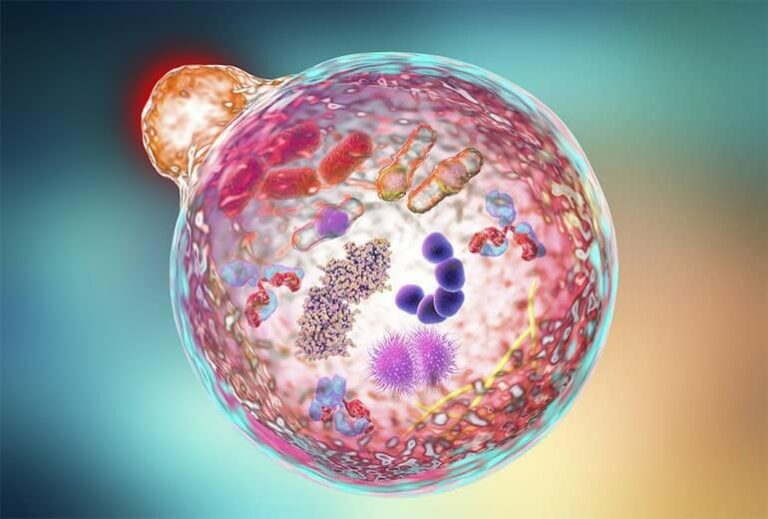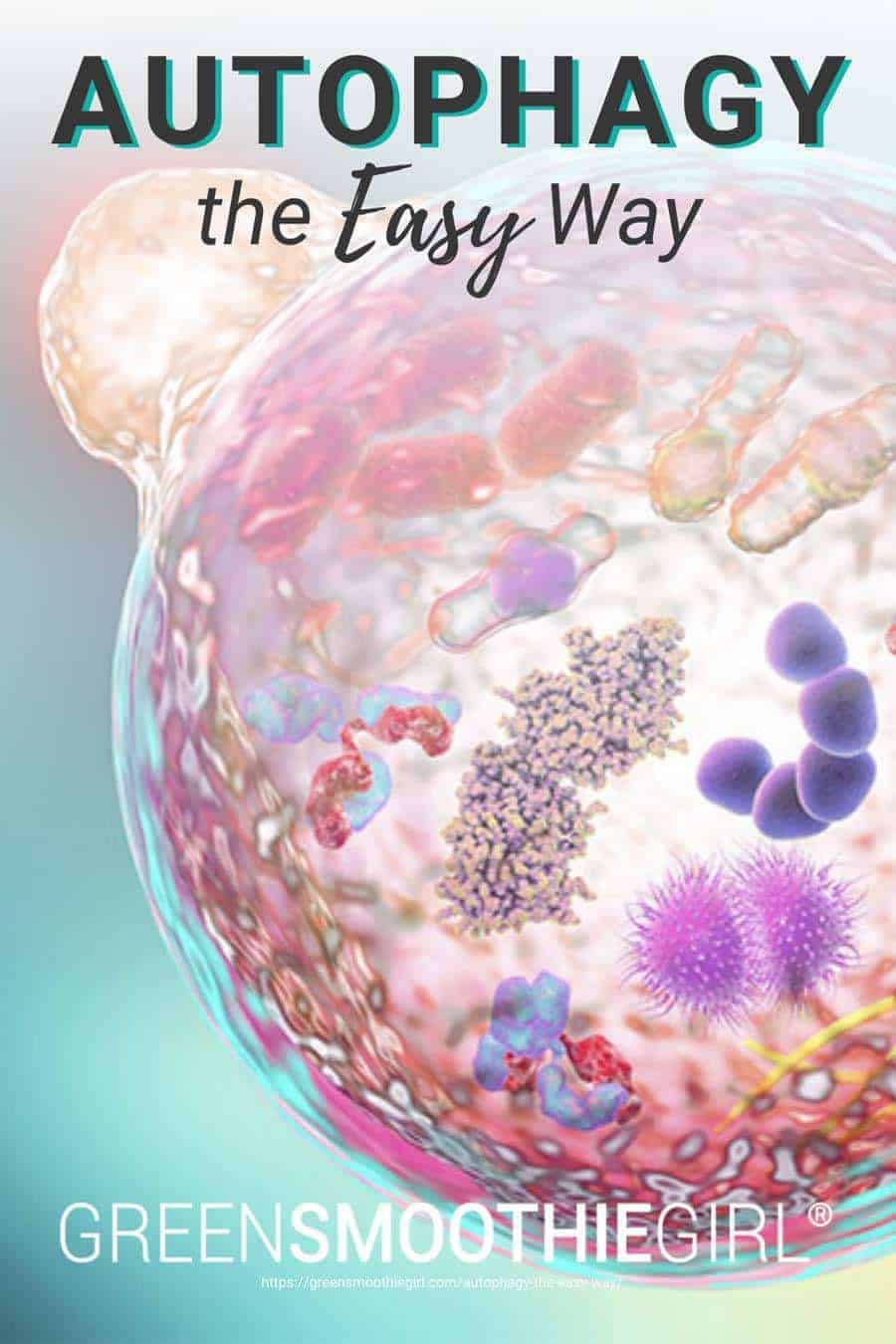Autophagy The Easy Way: How To Induce Autophagy Without Going Hungry

Have you ever really considered the fact that in nature, animals often go days without eating much? Of course, for much of human history we were in the same boat. Human beings didn’t start eating three square meals a day until very recently. And while that might seem like progress, those windows of fasting we lost were pretty darn important.
Our incredible bodies are primed to take advantage of food scarcity by using our own damaged proteins and cells for fuel (instead of consumed calories!), in periods of not eating, while simultaneously cleaning house in a process called autophagy.1
So, let’s talk autophagy: How it works, when it happens, and why you don’t have to starve yourself to reap its incredible health benefits!
In this article:
- What Is Autophagy ?
- How Autophagy Won the Nobel Prize
- How Is Autophagy Triggered?
- How Does Autophagy Work?
- How to Induce Autophagy — Without Going Hungry
- How Long to Fast for Autophagy
- Health Benefits of Autophagy
- Is Autophagy the Fountain of Youth?
- What if Autophagy Doesn’t Happen Regularly?
- What Is the Difference Between Autophagy and Apoptosis?
- TLDR: Autophagy
What Is Autophagy?
Autophagy (pronounced ah·TAA·fuh·jee) is a cellular process that is triggered by very low caloric intake and allows your cells to break themselves down and recycle damaged or old components. Roughly translated, autophagy means “self-eating.” Think of it like the Marie Kondo “tidying up” method, on a cellular level.
For a visual, imagine a cluttered room stacked with random piles of paper, drawers bursting with old clothes that don’t really fit anymore, and dust on the countertops. Now imagine rolling up your sleeves with some trash bags, a dust cloth, and a donation bin. That’s autophagy — except the cluttered room is one of your body’s 600 trillion cells!
And what’s so important about autophagy? A lot, actually. So much, in fact, that its discovery earned scientist Yoshinori Ohsumi a Nobel Prize in Medicine2 in 2016. And scientists the world over have called it one of the most important advancements in biology.
In my opinion, the discovery of autophagy, combined with the discovery that modified fasting achieves the benefits of autophagy--is the most important health and wellness discovery of the century so far!

How Autophagy Won the Nobel Prize
While scientists have known about autophagy’s existence since the 1960s, the process was considered a mystery until the 1980s, when Yoshinori Ohsumi began to hone in on exactly where, when, and how autophagy takes places within a cell.
Ohsumi primarily used yeast cells3 (which proliferate quickly) in his experiments. He learned that time periods of minimal or drastically reduced food intake (either during sleep, sickness, fasting, or times of starvation) activated a specific protein inside the cells, which triggered the cells to recycle damaged components and “clean house” on any accumulated waste.
Ohsumi’s work (which eventually won that Nobel prize in 2016!) has given scientists a new understanding of how autophagy can be used to harness the power of fasting, improve human health, prevent disease, and increase our quality of life.
How Is Autophagy Triggered?
Autophagy is always happening in some of our 600 trillion cells at any given moment.1 However, we now know (thanks to Dr. Ohsumi’s research) that there are a few specific triggers that kick autophagy into high gear:
The main trigger is a significant calorie deficit4 (of less than 800 calories). Each of our cells contains a unique protein sequence that can tell when caloric intake drops off. This protein sequence relays that information to a protein sequence responsible for triggering autophagy—and the Konmari Method of your cells begins!
Keep in mind that autophagy is a faucet—not a lightswitch. It’s always trickling. But the valve can be opened regularly, through caloric restriction and modified fasting.
How Does Autophagy Work?
Autophagy has three basic purposes, which can be accessed by all 600 trillion cells in the human body.
Each cell in your body is protected and surrounded by a lipid membrane. As you may remember from high school biology, that lipid membrane holds organelles (like mitochondria, the nucleus, and vacuoles). The cell’s organelles work together to produce energy, and keep the cell working properly in its assigned role. During times of food scarcity, your cells can access autophagy for three significant tasks:
- Cell turnover. Autophagy allows old or damaged cells to break down and rebuild their components.5
- Fuel and “cleanup” during significant calorie deficit: In sustained caloric deficit, damaged or mutated cells6 and bits of protein can be scavenged by other cells for fuel.
- Defend against invaders: Autophagy allows cells to protect themselves against viruses, bacteria, and yeast7 by essentially “breaking down” these harmful cells in the same way they would recycle its own components.
How to Induce Autophagy — Without Going Hungry
At first, when scientists like Ohsumi identified that autophagy took place during a fasted state, they assumed that caloric intake had to be ZERO.
However, new research by Dr. Valter Longo clearly shows that a modified fast of very low calorie intake (such as 600-800 calories during a 24-hour period, consumed in a 10-12 hour window), trigger benefits of sustained autophagy similar to a water-only fast.
That discovery comes as welcome news to 99% of the population who have families, a social life, and a 9-5 job to attend. It means that the benefits of autophagy don’t depend on going hungry. Even a three-day modified fast yields weight loss, improved markers of inflammation, and other health benefits of autophagy (more on that below!)
How Long to Fast for Autophagy
One of the biggest questions people have when fasting to induce autophagy is, “how long do I have to fast to really gain the benefits of autophagy?”
It’s an important question. And it all comes down to when autophagy starts — and peaks.
When Does Autophagy Start — and Peak?
The precursor to autophagy happens when your insulin levels drop, which triggers your liver to release its stores of energy (glycogen), for continued energy production.1 As those liver glycogen levels continue to drop, after about 14-16 hours of fasting, autophagy really kicks into gear.
After about 24 hours of fasting, the autophagy faucet really opens wide, and autophagy peaks until the fast is broken with higher caloric intake.
Longo’s research showed that modified fasting can achieve the same kind of regenerative results. One woman, Laura Peterson, whom we put on our 3-day modified fasting program, saw a decrease in inflammation 15 hours into the program--right at the time autophagy is kicking in-- saying, “I’ve been in intense, searing, chronic knee and hip 24/7 pain for 15+ years. And it’s gone, just like that.” The cessation of pain continued throughout her 3-day fast, and in a followup interview, Peterson said, “The pain and inflammation were completely gone for about a week after I finished the fast. But then I started eating all the unhealthy food I had been prior, and slowly but surely all the intense pain, grotesque swelling, and debilitating inflammation came back.”
[Related: Will A Fasting Diet Give You The Results You Want?]
Health Benefits of Autophagy
Canadian doctor and obesity expert Jason Fung, whose work has helped spread awareness of the effectiveness of fasting diets, says:
“There’s something uniquely and intrinsically good about fasting … It’s really getting rid of all that excess junk from your body, the excess glucose, the excess fat, the excess protein, because you have to understand that the process of renewal is not simply a building process. You have to tear everything down and then rebuild.”
Jason Fung
All of the profound health benefits of autophagy come from that process of cellular teardown and rebuilding:
Stem Cell Health and Wound Healing
Stem cells in the body are responsible for all tissue growth and regeneration, from the womb onward. One of the most exciting benefits of autophagy is its role in improving the health, quality, renewal, and metabolism of stem cells.8
Exploring the connection between autophagy and stem cells has incredible potential for human health, but particularly when it comes to healing wounds. After all, how fast we heal depends on tissue regrowth and the regeneration of new, healthy cells — both of which are controlled by stem cells!
Increases Quality of Life and Longevity
Scientists have proven that autophagy decreases as we age, opening the door to more “junk” in our cells that can predispose us to disease and cellular dysfunction. However, fasting (including modified fasting) has been proven to stimulate autophagy,9 even in older mammals.
Regular fasting, with the goal of autophagy, can go a long way to keeping cells in good working order, staving off disease, and improving the quality and length of our lifespan.
Tumor Suppression and Cancer Fighting
Autophagy is a process of breaking down and cleaning out junk in our cells — which includes cancerous, precancerous, and mutated cells.10 And because autophagy puts the body into “reuse and recycle” mode, it can suppress the growth rate of tumors.
While autophagy itself won’t cure cancer, it can act as a powerful deterrent and a powerful supplement to treatments. Scientists around the world are actively working to apply autophagy to cancer treatment protocols and research for a cure.11
Combats Insulin Resistance and Diabetes
Researchers have learned that autophagy plays a very important role in regulating blood sugar, facilitating proper insulin release, and decreasing insulin resistance, by rehabilitating damaged pancreatic beta cells12 (which control the release of insulin). Researchers like Jason Fung believe that autophagy may very well be key to treating and even reversing type 1 and type 2 diabetes.13
While it’s important for people with diabetes to work closely with their health professional when fasting, a carefully supervised modified fast can make a significant difference for individuals with pre-diabetes, diabetes, or a high A1C blood sugar test.
Neurodegenerative Conditions Like Alzheimer’s and Parkinson’s
One of the most exciting applications of autophagy is neurodegenerative conditions like Alzhemier’s, Parkinson’s, and Huntington’s.14
While these conditions have very different symptoms, they all share a critical common characteristic: a buildup of proteins inside of the brain’s neurons, and the dysfunction of mitochondria inside those neurons that block proper signaling. Autophagy has shown a lot of promise in “cleaning house” on this buildup of damaged proteins and mitochondria.
Helps Prevent Loose Skin After Weight Loss
Fasting as a means of weight loss has made a big splash in recent years. Not only because it works, but because people noticed that the telltale post-weight-loss loose skin wasn’t happening for individuals with a lot of weight to lose.
[Related: How To Cycle 3-Day Modified Fasts For Healthy, Sustainable Weight Loss]
Researchers suspect that autophagy is the reason behind the lack of loose skin! During fasting, your body uses fat stores and recycled cell components for fuel. This means that cells are actively rebuilding themselves during the weight loss process, which results in better elasticity, and a whole new you — quite literally.
Autophagy can also help restore elasticity and tone to loose skin from pregnancy or previous weight loss, because of its role in stimulating stem cells and improving the health of skin fibroblasts15 (cells that play a key role in producing collagen).
So, Is Autophagy the Fountain of Youth?
Not quite. While autophagy does play a significant role in longevity, cellular health, and disease prevention, it’s just one factor in the aging process.
Damage to DNA, the chemical load we are exposed to, and compounded wear and tear on the body’s systems mean that even with autophagy, all of us will still age and die. However, autophagy can mean the difference between succumbing to certain diseases early in life, and living to a healthy old age.
Autophagy also makes a big difference in how strongly your biological age matches up with your numerical age. For instance, it’s absolutely possible to be a 50 year old with the heart of a 40 year old, based on diet, exercise, and keeping your cells healthy through regular fasting.
What if Autophagy Doesn’t Happen Regularly?
In baby mice, completely, blocking autophagy16 results in death. When just one process of the body is restricted, diseases like cancer develop.
It’s basically impossible to have “too much” autophagy. In fact, as we age, the “faucet” of autophagy naturally slows — unless we fast regularly. However, it’s important to understand that more isn’t always better when it comes to autophagy and fasting. In cases of long-term food deprivation (for instance, longer than a week without any nutrient intake), cell health will gradually start to deteriorate, and cellular processes will slow until death eventually occurs.
What Is the Difference Between Autophagy and Apoptosis?
Apoptosis, or cell death,17 is a different process from autophagy, although it’s easy to see why the two processes are often confused. Autophagy, in most cases, preserves the nucleus of the cell while recycling and discarding protein sequences and components inside the cell.
Apoptosis, on the other hand, destroys the cell completely. In the case of cancer, this becomes necessary. However, autophagy can keep cells from becoming damaged to the point that apoptosis is necessary, or cancer develops.
[Related: How Often Can You Do A 3-Day Fast?]
TLDR: Autophagy
Autophagy is the cellular process of recycling damaged proteins and cells for fuel during times of low calorie intake. Nobel-prize winning research by Yoshinori Ohsumi revealed that fasting opens the floodgates for autophagy to “clean house” in our bodies. And additional research reveals that a modified fast of 500-800 calories induces the benefits of autophagy as well!
While autophagy isn’t the literal fountain of youth, it shows tremendous promise for increasing human lifespans, treating neurodegenerative conditions like Alzheimer’s and Huntington’s, reversing diabetes and insulin resistance, wound healing and stem cell health, and cancer fighting.
Read Next: Modified Fasting 101: The Ultimate Beginner’s Guide

Disclosure: This post may contain affiliate links that help support the GSG mission without costing you extra. I recommend only companies and products that I use myself.

Resources:
- Yoshii SR, Mizushima N. Monitoring and Measuring Autophagy. Int J Mol Sci. 2017;18(9):1865. Published 2017 Aug 28. doi:10.3390/ijms18091865
- Levine B, Klionsky DJ. Autophagy wins the 2016 Nobel Prize in Physiology or Medicine: Breakthroughs in baker's yeast fuel advances in biomedical research. Proc Natl Acad Sci U S A. 2017;114(2):201–205. doi:10.1073/pnas.1619876114
- Zimmermann A, Kainz K, Andryushkova A, Hofer S, Madeo F, Carmona-Gutierrez D. Autophagy: one more Nobel Prize for yeast. Microb Cell. 2016;3(12):579–581. Published 2016 Dec 5. doi:10.15698/mic2016.12.544
- Wei S, Han R, Zhao J, et al. Intermittent administration of a fasting-mimicking diet intervenes in diabetes progression, restores β cells and reconstructs gut microbiota in mice. Nutr Metab (Lond). 2018;15:80. Published 2018 Nov 20. doi:10.1186/s12986-018-0318-3
- Glick D, Barth S, Macleod KF. Autophagy: cellular and molecular mechanisms. J Pathol. 2010;221(1):3–12. doi:10.1002/path.2697
- Antunes F, Erustes AG, Costa AJ, et al. Autophagy and intermittent fasting: the connection for cancer therapy?. Clinics (Sao Paulo). 2018;73(suppl 1):e814s. Published 2018 Dec 10. doi:10.6061/clinics/2018/e814s
- Grose C. Autophagy during common bacterial and viral infections of children. Pediatr Infect Dis J. 2010;29(11):1040–1042. doi:10.1097/INF.0b013e3181e77f43
- Boya P., Codogno P., Rodriguez-Muela N. (2018). Autophagy in stem cells: repair, remodelling and metabolic reprogramming. Development 145:dev146506. 10.1242/dev.146506
- Cuervo AM, Bergamini E, Brunk UT, Dröge W, Ffrench M, Terman A. Autophagy and aging: the importance of maintaining “clean” cells. Autophagy. 2005; 1:131–40. 10.4161/auto.1.3.2017
- White E., Karp C., Strohecker A.M., Guo Y., Mathew R. Role of autophagy in suppression of inflammation and cancer. Curr. Opin. Cell Biol. 2010;22:212–217. doi: 10.1016/j.ceb.2009.12.008.
- Mathew R, Karantza-Wadsworth V, White E. Role of autophagy in cancer. Nat Rev Cancer. 2007;7(12):961–967. doi:10.1038/nrc2254
- Yang JS, Lu CC, Kuo SC, et al. Autophagy and its link to type II diabetes mellitus. Biomedicine (Taipei). 2017;7(2):8. doi:10.1051/bmdcn/2017070201
- Marasco, Michelle R. Linnemann, Amelia K. β-Cell Autophagy in Diabetes Pathogenesis, Endocrinology, Volume 159, Issue 5, May 2018, Pages 2127–2141
- Fujikake N, Shin M, Shimizu S. Association Between Autophagy and Neurodegenerative Diseases. Front Neurosci. 2018;12:255. Published 2018 May 22. doi:10.3389/fnins.2018.00255
- Fujikake N, Shin M, Shimizu S. Association Between Autophagy and Neurodegenerative Diseases. Front Neurosci. 2018;12:255. Published 2018 May 22. doi:10.3389/fnins.2018.00255
- Fujikake N, Shin M, Shimizu S. Association Between Autophagy and Neurodegenerative Diseases. Front Neurosci. 2018;12:255. Published 2018 May 22. doi:10.3389/fnins.2018.00255
- Elmore S. Apoptosis: a review of programmed cell death. Toxicol Pathol. 2007;35(4):495–516. doi:10.1080/01926230701320337
Posted in: Detox, Fasting, Health Concerns, Healthy Weight, Lifestyle















No comments found, but you can be our first!